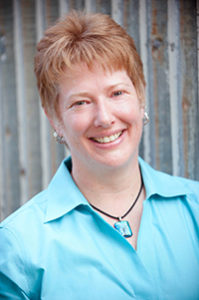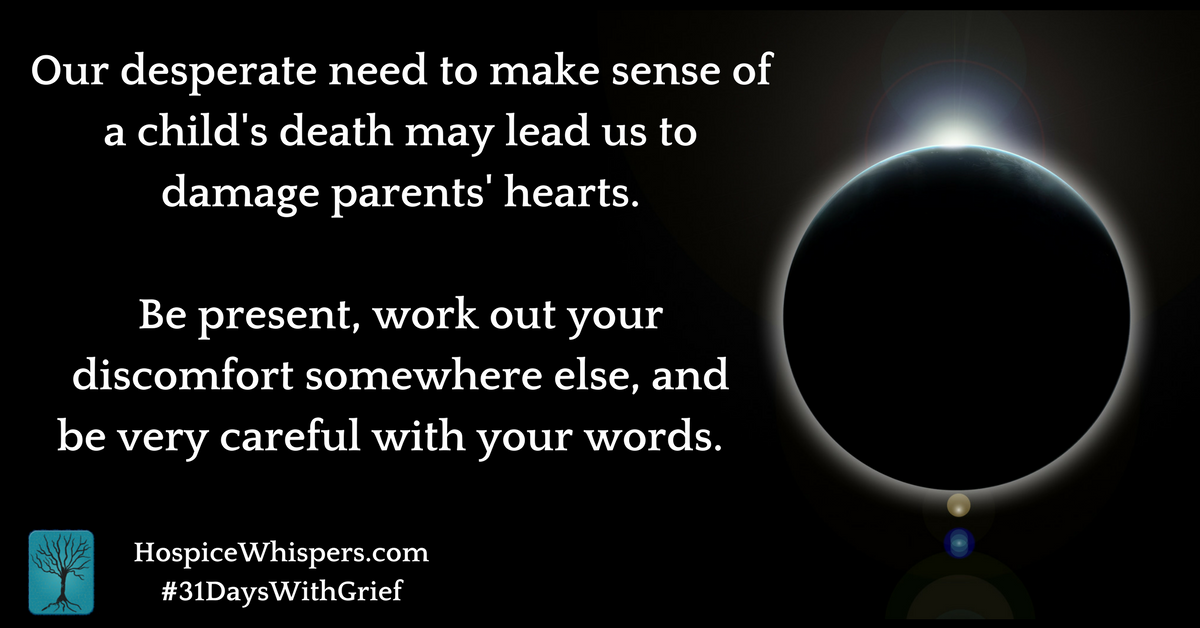31 Days of Walking with Grief: Others’ and Our Own
Day 23—Parental Grief
This is a month-long series to support persons grieving and those who love them. It includes content from “Sharing Our Stories: A Hospice Whispers Grief Support Workbook” available through Amazon and wherever books are sold.
As close as I can understand…
I tread gently when speaking of any grief I have not personally experienced. I did learn how amazing it is to love a child as a step-parent over a period of years.
I will never regret a single 2:00 a.m. wake up because of a nightmare. I’ll never begrudge even a moment of gently holding back her long hair with one hand as she puked up her toenails while worriedly calling the doctor for an appointment with my other. Every second was worth loving her.
I got a small taste of what it is like to lose a child when my relationship ended and I had no legal right to see this small, funny, brilliant, kind, beautiful human whom I absolutely adored. I did not give birth to her, but I felt the umbilical cord cut, grieved deeply, and miss her still.
As much as it hurt, and it did hurt too much to breathe for a very long time and I still get misty-eyed and choked up when I speak of her, I took comfort in knowing she was still alive. I imagined the others who would come into her life to love her. I prayed for her daily, and do still. I smile when I remember moments and antics. I wondered about her learning to drive, what high school was like for her, where she’s chosen to go to college and what she’s finally (for now) decided she wants to study and do and be for her career.
For me, knowing she was and is still in this world, and trusting the universe to care for her made it all easier to accept, because I trusted she was happy, had a future, and that perhaps I may even get the chance to see her again someday.
I can barely imagine that pain being even an ounce bigger by having to live with the death of a child.
We don’t compare pain, but acknowledge each grief’s unique features…
In Sharing Our Stories: A Hospice Whispers Grief Support Workbook, I wrote the following:
“We don’t compare grief, lest a person minimize their own pain if they believe it to be somehow less challenging than another’s experience. For example, some may say, ‘Oh, they’ve had it much worse than I have.’ This can lead a person to not feel as if they have a right to grieve as deeply or as long as they may need to. It can also leave them feeling guilty or ashamed about how they feel….
While we do not compare, there are forms of grief that have unique characteristics that challenge us in different ways, such as grief related to a trauma or a sudden death. The death of a child or other young person can pose such a challenge for us…
It is natural for humans to think that parents will not outlive their children. When it does occur, it poses an existential challenge—something that flies in the face of how we believe the world should be, how we make sense of things, and how we understand questions of existence and meaning and suffering. We may hear, or find ourselves saying, ‘Parents should never have to bury a child,’ or ‘Children should be able to grow up and live out their whole lives.’”
(from Sharing Our Stories, pg. 99-100)
Because the death of a child can so challenge our sense of the way the world should be, our defense mechanisms may come up even more strongly to try to make sense out of it all or to decrease the impact we feel about it. But we must guard against our discomfort causing them even more damage and trauma.
What to avoid when speaking to a parent who is grieving…
Here are a few things to remember when interacting with parents of children who have died, whether before or after birth:
- Children who are stillborn or miscarried are no less valued and no less loved by their parents. Do not minimize this loss. Honor the death and find ways to show up well for these parents, as this form of grief commonly falls in the category of Disenfranchised Grief.
- Ask, “What is their name?” The child is still very much present in their parents’ hearts and minds, so referring to them in the past tense can feel harsh or disrespectful.
- If you do ask about the child’s age, be sure to NOT make it appear in any way that a younger age makes it somehow less traumatic to the parent. This is minimizing and dismissive. It can be tempting to use this information to feel like, “Oh, well they were only 2 months old, so that mustn’t have been that bad. I mean, it’s not like they…(insert excuse to make the pain not that bad, here).” Don’t injure them further by saying such insensitive things to decrease your discomfort. As I wrote in Sharing Our Stories, “Grieving parents often state their child’s life cannot be measured in hours, days, or years, but by the love their presence generated in the world—however long they were physically with us.”
- Do not tell the parent in any way how they should feel, what they should think, what they should believe, or how they should act or respond. There are no right or wrong answers here, or with any grief. Each person must do whatever they need to find peace and meaning and should never have meaning imposed upon them,
- Examples of imposing meaning, as well as cliché’s and theologizing to avoid, are:
- “God needed another angel.”
- “God was saving them from some worse experience later.”
- “They were too good for this earth.”
- “Well, at least you have (or can have) other children.”
There are more, but any parent whose child has died is probably ready to scream right now being reminded of or hearing these, so I hope this gives you an idea.
As always, if a parent’s form of coping is to believe any of these, it’s okay to affirm their feelings and beliefs that are getting them through, but make certain such words come from THEM. If it’s not helpful for them, the opposite of not helpful isn’t benign, it’s traumatic and damaging. Don’t risk it.
It is always safe to say, “I wish I knew what to say. I’m so sorry I don’t. But I care and I’m here, however and whenever you need.” Then follow that statement up.
- Offer to run an errand. Offer to care for the house/kids/animals/yard. Invite them to lunch and be prepared to listen the whole time if they need to talk, without needing to jump in and speak over them. Let it be their space.
- When you leave messages, make it clear that there is no pressure for them to respond, but to do so only if it is good and helpful for them; that you won’t take it personally, at all, if they do not do so. Let them know it is a simply given offer with no expectation on them in any way. And mean it!
So much more to say…
There’s so much more that could be said. Whole books and blog series and websites are devoted to this topic. For now, I will leave you with one of the many poems contributed to the Sharing Our Stories grief workbook by Janie Cook.
Janie’s own son, Matt, died of depression through suicide that claimed his life in 2007. She graciously offered her work to me from her blog, LivingWithTheLossOfaChild.blogspot.com:
First you try to take in all that is lost . . .
the dreams that will never be,
the deafening absence,
the precious reminders of the presence of this child
that literally rip a hole in your heart each time you see them
and, at the same time, you try to take in all the amazing gratitude you feel . . . ,
for the unforgettable moments you have been given,
for the vivid memories that replay like a beloved movie in your mind, and
for the amazing gift of a love as immense as this ?
Janie continues:
Grief is so confusing! It is packed with both of these heavy opposites. So, we careen from one to the other like a marble in a pinball machine – bouncing first one way then another. It is enough to make you crazy! It does make you crazy.
I carry an image in my mind of what healing looks like. It is standing with both feet planted firmly on the earth, arms outstretched, palms up . . . holding the son I have lost in one hand and the son I have been so graciously given to love in the other.
In my better moments, I am balanced between these two truths. And, I believe that healing is learning to keep this balance until it becomes so familiar to us that we do it without thinking. . . . gently holding one reality and then the other . . . . accepting the truth of both.
~Janie Cook
May those who love someone whose child has died find support to help you support them. May those of you who know what it is to face the death of a child find comfort and peace as you find your way in your own time.
Blessings,
Carla
 Rev. Carla Cheatham, MA, MDiv, PhD, TRT has served hospices as a chaplain and bereavement coordinator. She’s the Section Leader for the Spiritual Caregivers Section of the National Hospice and Palliative Care Organization and an adjunct professor at the Seminary of the Southwest. Through her Carla Cheatham Consulting Group, Carla provides training and consulting for professional caregivers nationwide. She is the author of Hospice Whispers: Stories of Life and its companion volume, Sharing Our Stories: A Hospice Whispers Grief Support Workbook. Her next book, On Showing Up with Suffering: Others’ and Our Own, is set to publish in 2017.
Rev. Carla Cheatham, MA, MDiv, PhD, TRT has served hospices as a chaplain and bereavement coordinator. She’s the Section Leader for the Spiritual Caregivers Section of the National Hospice and Palliative Care Organization and an adjunct professor at the Seminary of the Southwest. Through her Carla Cheatham Consulting Group, Carla provides training and consulting for professional caregivers nationwide. She is the author of Hospice Whispers: Stories of Life and its companion volume, Sharing Our Stories: A Hospice Whispers Grief Support Workbook. Her next book, On Showing Up with Suffering: Others’ and Our Own, is set to publish in 2017.



Leave a Reply